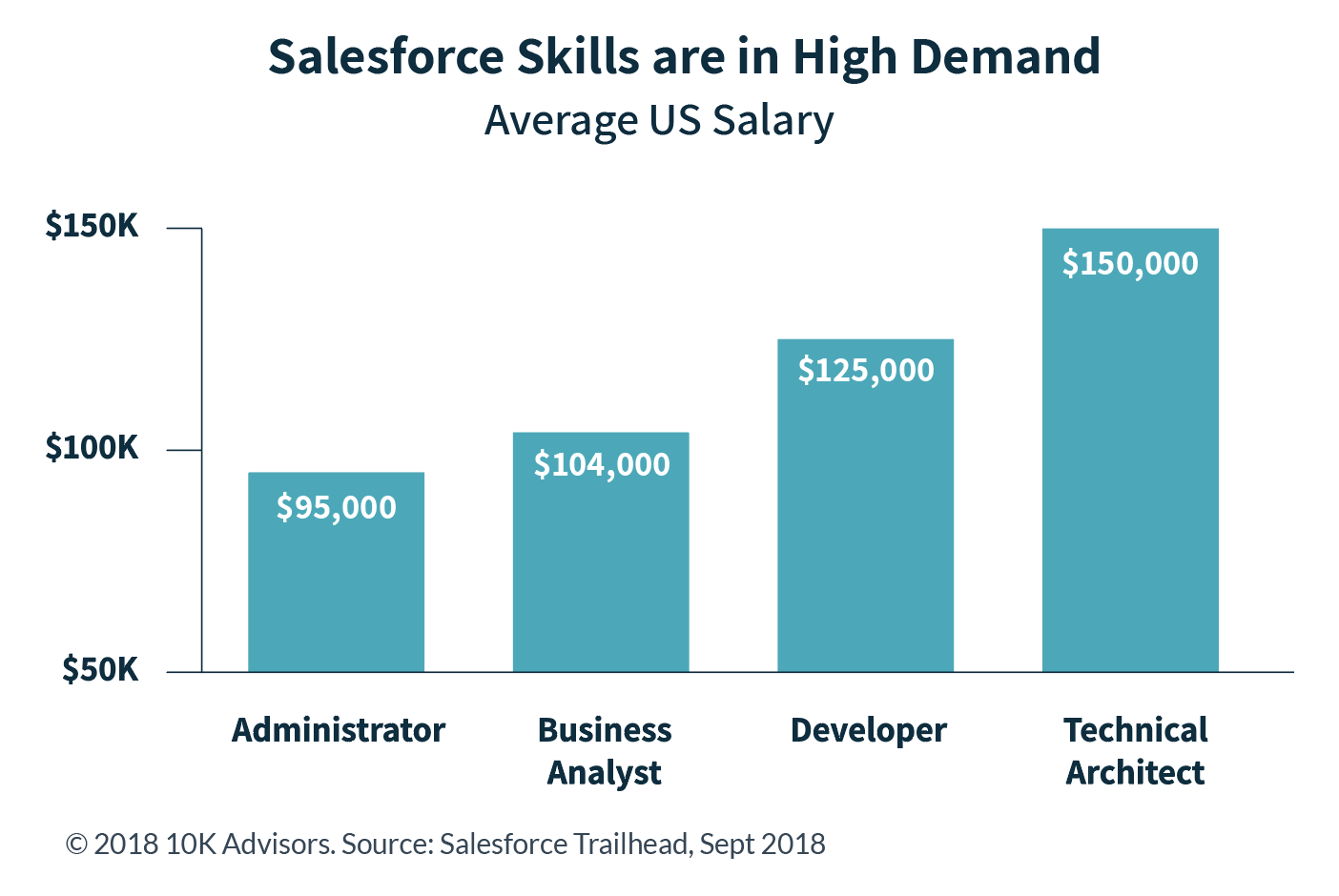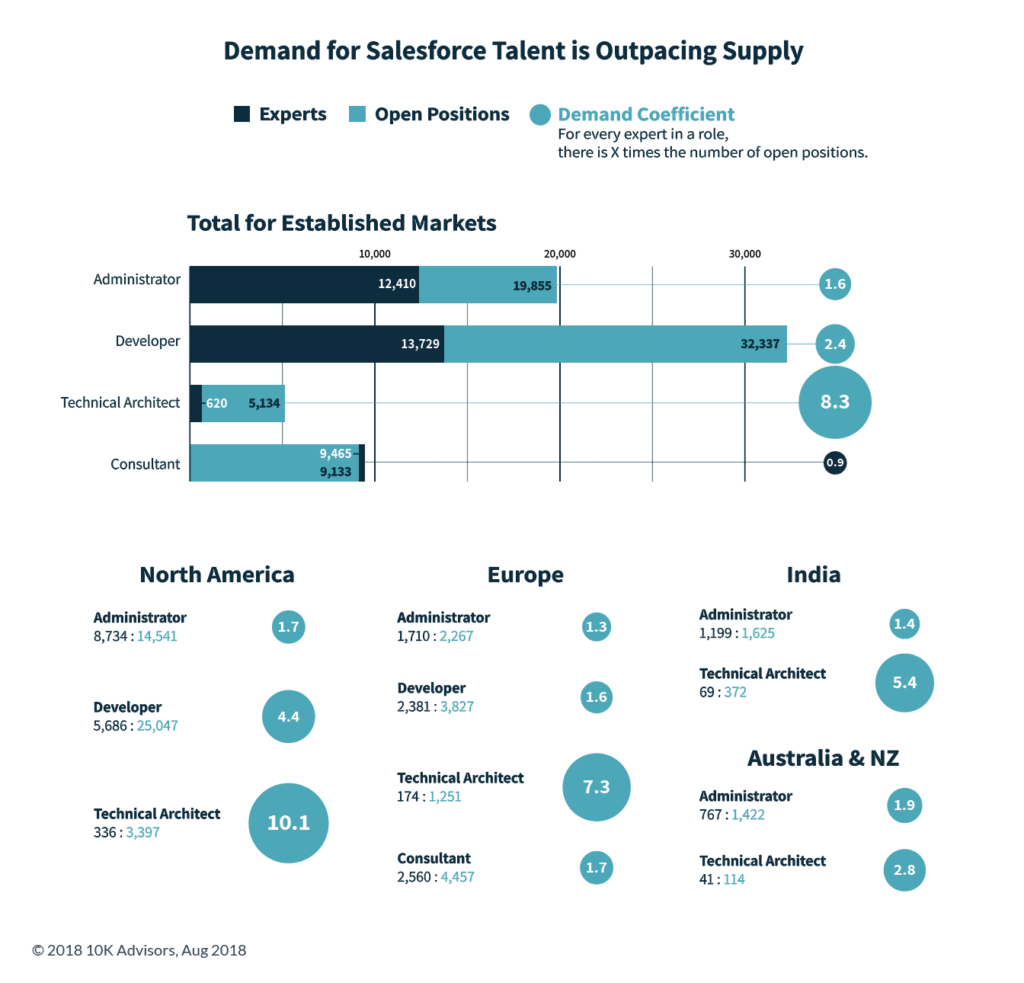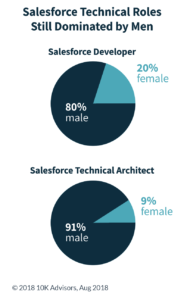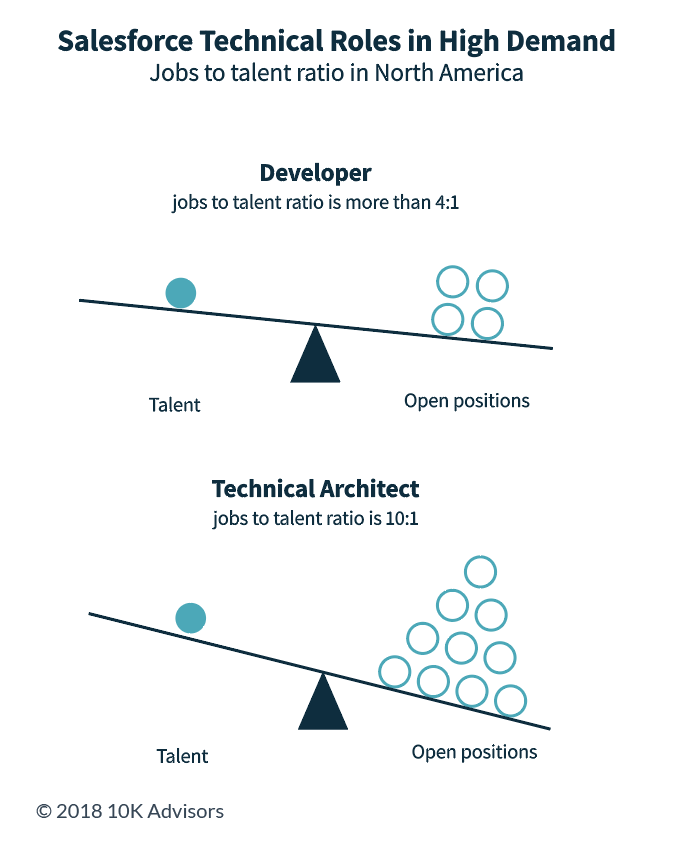It’s Dreamforce week, and to state the obvious, Dreamforce is big. Nearly 200k people attending and more than 1M streaming. Over 3k sessions. And at least 400 partners and vendors.
Why?
Because people are doing amazing things on the Salesforce platform. That’s the good news.
The bad news is that every single attendee, whether you’re a customer, partner or prospect wants to do even more. More of everything – from content to commerce, nurturing to AI. And while the platform may not currently be able to do absolutely everything imaginable, the limiting factor typically comes down to talent.
The challenge of finding the right talent to help you achieve your objectives with Salesforce is very real. Research that was highlighted in our 2018 Salesforce Talent Ecosystem Report, released last week, found that demand for Salesforce jobs is growing 1.3x faster than the overall job market (which is even more meaningful when you remember we’re in a booming economy with “full employment”). The talent crunch is real. So how do customers and partners find the talent they need need squeeze everything you can out of the platform?
As a company that connects customers and talent in the Salesforce ecosystem, we see four choices for finding talent to apply to your Salesforce needs:
Hire full time employees. This can be a great strategy for building your core team if you need someone who understands the platform and can keep your house in order and users supported. However, when it comes to finding specialized skills and scaling capacity, there are challenges and potential drawbacks. With the breadth and depth of Salesforce use cases and responsibilities, it can be difficult to hire a comprehensive team that can do it all. Are you in need of generalists who know a little about a lot of Salesforce things? Or are you looking for specialists who fit the precise needs of the moment? Will this FTE need to manage people or projects? Or just crank out config and code? Even if you can cobble together that list of requirements, vetting the skills of your applicants is difficult, and it will change over time. But let’s say you navigate all of those pitfalls and find a few Salesforce rockstars, which according the our research will cost you somewhere between $95,000 and $150,000+ for technical roles. Once you get them onboard you need to keep them, which is challenging in a hot market where recruiters will certainly be seeking to lure them away. In fact, if your recruit leaves for greener pastures within one or two years, you’ve actually sunk over $67,000 into recruiting and onboarding ($22,237 and $45,000 respectively) only to be right back at square one again.

Engage with a large consulting company. Another alternative is to work with an outside partner, perhaps one of the top 30 large consulting companies that employ a full two-thirds of the certified professionals in the partner ecosystem. If you know what you want, and can find the right partner that fits your budget and your organizational culture, this might be a viable option. However, unless you are ready to commit to a large spend with these consultants, expect it to be hard to get their best resources staffed on your project. In addition, these large consulting firms have to afford their own overhead of recruiting and retaining talent, which means those costs are often passed to their customers (expect to pay $125-$300 per hour). Because of this expense and the inflexibility of how these consulting companies engage, many customers end up treating their Salesforce implementation as a single project instead of an ongoing program. And while this might give them a short term solution, if it’s not maintained and nurtured, those customers will never get the full value of the platform as it evolves.
Find Boutiques or Independent Contractors. There is another segment of the Salesforce partner ecosystem that is both vibrant and growing rapidly – small boutiques and independent contractors. In fact, we found 972 smaller consultancies that are home to 33% of all certified Salesforce professionals. Many of these boutiques and independents are made up of extraordinary talent who appreciate the balance and focus of an independent firm. The challenge with this approach is finding and vetting what can essentially be a needle in a haystack. And even after finding a firm or individual that meets one or more of your needs, it’s likely you’ll have to continue to search as your needs change and you need to different skill sets or additional capacity to achieve your goals. As with any other consulting partner, customers will need a tight scope of work with clear deliverables, lest scope and costs get out of hand.
Talent marketplaces. Marketplaces are getting their fair share time in the spotlight – however they operate very differently from each other and customers have to know what they are signing up for. The biggest problem with most is that the burden of success is placed squarely on the customer. Try to buy a car on Craigslist and you may encounter wildly over inflated car descriptions or the uncertainty of a rushed transaction for a ride you hope is a good deal but didn’t have time to check out. Sell a car and you’ll have to vet “money-order” scammers and waste time on appointment no-shows. Uncertainty abounds. Contrast that with the curated experience of renting a house on Airbnb. They handle validation of people and spaces, reviews reveal pros and cons, the payments are smooth and trustworthy, and there is an escalation process if something goes wrong. Imagine that smooth experience applied to a marketplace that connects Salesforce customers with the talent they need, when they need it. Unlike existing freelancer platforms, 10K Advisors is a full-service talent marketplace that plays the role of both platform and partner, taking on the burden of sourcing the right team for a particular client need, validating the skills and work experience of that talent, and helping ensure customers get the quality of work and outcome they expect.
A few days from now, when your bag is full of schwag and you board a flight home from Dreamforce with more ideas than you have talent to execute them, it will be time to decide which model is right for you.



 There are a few implications.
There are a few implications. 